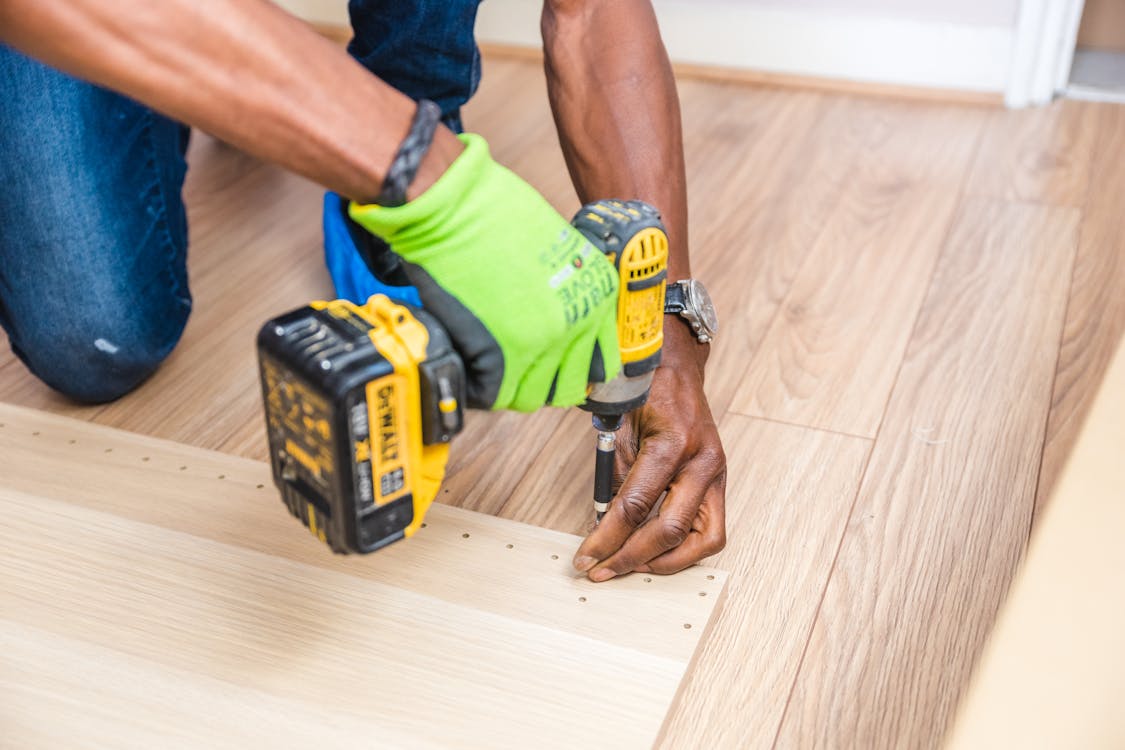
Do you have a home repair on your hands? Sometimes, it’s better to bring in the experts. Hiring reliable licensed contractors requires due diligence, just like buying a property. In both cases, clear communication, written contracts, and thorough background checks are essential. By applying the same approach to managing contractors as you would to vetting real estate professionals, you can reduce the risk of scams and ensure a smooth, successful outcome. click here to read the entire blog on how to do a background check.
Here’s a simple guide to help you pick and manage the right folks for the job.
Ready to start your project? Let’s chat! Call me at 480-466-4917 or shoot me an email at jay@jaybrugroup.com. I can make finding the right contractor a breeze for you!
Remember, your home project deserves a superhero – let’s find the perfect one!
Types of Subcontractors:
When fixing stuff at home, you might need different experts. There are two main types: the boss (general contractor) who oversees everything and the specialists (subcontractors) who do specific tasks.
- Excavation: An excavation contractor will provide services related to earth moving and site prep such as grading and digging footings, or prepping areas for landscaping.
- Concrete: A concrete contractor will handle all elements of pouring concrete for driveways and walkways, floors, home foundations, footings, and more.
- Framing: Framing contractors assemble the frame of the project, known as the bones of the home.
- Roofing: Roofing contractors install roofing materials such as shingles, flashing, rubber roofing, and more.
- Plumbing: Plumbers handle the home’s water supply and drain lines, and may tackle specialty jobs like in-floor heat installation.
- HVAC: HVAC contractors will cover all heating and cooling needs, including ductwork HVAC unit installation replacement, and service.
- Electrical: Electricians cover the scope of electrical supply installation for a project.
- Finish Carpentry: Finish carpenters install things like millwork, trim, moldings, doors, and cabinetry.
- Drywall: Drywall hangers will hang drywall, as well as mud the drywall and prep it for paint.
- Painting: Painters can be hired to cover all painting needs, including final drywall prep and caulking before painting.
- Flooring: Floor installers can handle a variety of flooring needs, from installing tiles to hardwood to carpets.
Note: This list is intended as a general reference point and may not directly reflect the capabilities or services offered by the subcontractor you hire. Always discuss the needs of your project before hiring a subcontractor.

Licensed vs. Handyman:
While a friendly neighbor with a toolbox might seem tempting, remember: licensing and insurance matter. Licensed contractors have met specific training and experience requirements, and their insurance protects you from financial headaches if something goes wrong. If they’re not licensed, they’re called Handymen, and Handymen can only work on projects up to $1000, otherwise you need a licensed contractor. Do not give a handyman money up front, the ROC won’t help you, and your money is at risk.
The problem in Arizona is that handymen are doing entire projects $100,000+ and you do not have anyone to go back on. So always get a licensed contractor.
Hiring a General Contractor (GC):
Think of a GC as the conductor of your construction orchestra. They handle all the moving parts, ensuring your project runs smoothly. Double check there license before hiring here. Here’s what that entails:
- Subcontractor Management: The GC hires and manages all the subcontractors (electricians, plumbers, etc.) directly. You only deal with the GC, simplifying communication and coordination.
- Cost and Markup: GCs typically earn their fee through a markup on subcontractor costs (think commission) or a flat fee. This covers their expertise in managing the project, scheduling subs, handling payments, and overseeing the entire construction process.
- Project Logistics: They handle the nitty-gritty: permits, insurance, dumpsters, porta-johns, and more. You focus on your vision, not the logistics.
While DIY can be tempting, hiring a GC often leads to smoother projects, especially for complex jobs. Their expertise and management skills can save you time, money, and headaches in the long run.

When to Hire a Contractor:
Not every project needs a pro. Ask yourself:
- Skill & Confidence: Do I feel comfortable tackling this myself? Do I have the necessary skills and tools?
- Time Availability: Can I dedicate the time needed for this project? Will it disrupt my routine too much?
- Budget: Can I afford the cost of hiring a contractor, including materials and labor?
If you answered “no” to any of these, calling in a contractor might be the smartest (and sanest) choice!
Permit Requirements:
Before you dive in, check with your local building department. Some projects, like electrical upgrades or bathroom additions, might require permits. Hiring a licensed contractor often ensures they handle permits, saving you time and hassle.
Tips for Hiring the Right Contractor:
- Check Past Work: Ask for references and online reviews. Get a feel for their quality and professionalism. Do a background check and search online to see if there are any claims against them or if they still have their license.
- Get Multiple Estimates: Don’t settle for the first offer! Compare prices and scope of work to find the best fit.
- Scope of Work is Key: This document outlines exactly what’s included (and excluded) in the project. Be clear and specific to avoid surprises later.
- Ask the Right Questions: Prepare a list of questions about experience, insurance, warranty, and timeline.
- Listen to Your Gut: Choose someone you feel comfortable with and who clearly communicates. Trust is key!
- Get their drivers license and do a background check, click here to learn how.

Tips for Hiring the Right Contractor
Past Work: Check online reviews, references, and completed projects to gauge quality and professionalism.
Reputability Checkpoints:
- Longevity: Look for established businesses, ideally 10+ years with the same name. Younger companies can still be reputable but consider experience a plus.
- Presence: A physical office adds trust, though home offices or answering services don’t necessarily disqualify.
- References: Seek positive current references (ideally 5+), and be wary of no references or negative feedback.
- Specialization: When possible, choose contractors specializing in your project type for optimal expertise.
Get Estimates: Compare bids, scrutinize the scope of work details (including allowances, assumptions, and exclusions), and prioritize value over just the lowest price.
Bid Comparison Process:
- Gather & Scrutinize: Collect bids and analyze their scope of work, including allowances, assumptions, and exclusions.
- Evaluate Value: Compare the overall bid price with the value offered by each scope of work.
- Negotiate & Refine: Discuss desired changes with each contractor and adjust comparisons accordingly.
- Make Your Choice: Select the bid that best balances value, price, and your preferences.
Example Highlights:
- Painters: Focus on surface preparation methods, number of paint coats, and quality of materials.
- Landscapers: Check for proper planting techniques, guarantees, and watering instructions.
- Roofers: Pay attention to flashing details, ice/water shield usage, and cleanup practices.
- Plumbers: Look for fixed prices and avoid per-foot charges for specific services
License & Insurance: Verify licensure, request insurance certificates, and consider bonded contractors for extra security.
Payment: Invoice after completion preferred, though some expect immediate payment (avoid cash!). Upfront costs for materials (e.g., roofers, painters) may be requested, but keep it below 33% unless highly reputable.
Take Your Time: Choosing the right contractor is crucial. Scrutinize contracts for clarity – unclear terms often mean rushed work. Resist signing under pressure, even for discounts.
Pre-screen potential contractors now for future urgent needs. Skip the last-minute rush & avoid picking someone blindly!
Questions to Ask a Potential Contractor
In summary, here are the questions to ask a potential contractor to help you decide who to hire:
- How much will you charge for the job?
- What will that price include?
- What will that price exclude?
- What assumptions are there?
- How long will the project take and will you guarantee the timeline in writing?
- Will you put every agreement in writing?
- How much of that price will you require upfront and why?
- Do you have a website with reviews?
- How will the remainder of the payment be handled?
- Are you licensed? Can you provide your license number to check with the AZ Contractors Registrar website?
- Are you insured and bonded? Can you show me your certificates?
Based on the information provided above, assess each contractor’s answers and move forward with the one that best fits your preferences.

Managing Your Contractor:
Before your contractor starts, solidify the working relationship:
- Written Scope: Ensure a detailed, signed document outlines both parties’ expectations, including:
- Cleanliness: Specify cleanup requirements and protection of surrounding areas (e.g., roofer protecting landscaping).
- Access & Utilities: Discuss contractor access when you’re away and their use of water/electricity.
- Concerns & Changes: Communicate potential concerns and establish a clear protocol for change orders (reviewing fairness and scope impact).
By setting expectations upfront and in writing, you pave the way for a smooth and successful project.
- Written Scope: Ensure a detailed, signed document outlines both parties’ expectations, including:
Unexpected changes? Split the difference for a fair, friendly solution. Remember, good relationships build smooth projects!
Staying Organized:
Keep all paperwork, including contracts, invoices, change orders, and COIs, neatly organized in a dedicated file for easy reference throughout the project.
Completion & Beyond:
Before making the final payment, take a thorough walk-through with the contractor to ensure everything meets your expectations and the site is cleaned as agreed upon. Don’t be pressured into rushing the final payment. If satisfied, express your appreciation and consider leaving a positive review to help others find reliable contractors.
Hopefully, this overview provided useful information on successfully hiring, managing, and working with contractors. Don’t be afraid to ask for help from one of these pros when needed—that’s their job.
Take control of your safety!
Be sure to keep yourself safe from real estate scams. With plenty of scams out there, we’ve put together a guide with easy tips to help you avoid them, along with helpful links for doing background checks. Check out our guide!
FAQ
Maybe, but check permit requirements. It’s a lot of work but you’re allowed to on your home own home.
Depends on project size. Large projects with revisions might incur a fee for the contractor’s time but get 3 estimates.
GCs hire subs for specialized skills or when they’re swamped. They manage the project while subs do the hands-on work. Be aware that most GC’s upcharge you up to 20% more than what they pay their subs. And its not always cheaper if you do yourself, but time is money.



